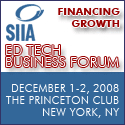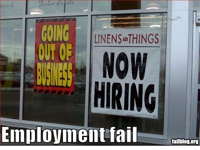 This article is based on notes from a panel at the Ed Tech Industry Forum in New York that took place in December. The insights the panelists shared are no less relevant now that we are into the new administration and sorting out the economic stimulus.
This article is based on notes from a panel at the Ed Tech Industry Forum in New York that took place in December. The insights the panelists shared are no less relevant now that we are into the new administration and sorting out the economic stimulus.
The panel consisted of:
- Moderator – Todd Brekhus – VP and CMO Plato Learning
- Francis Alexander – VP – Scholastic
- Robert Iskander – CEO VIP Tone
- Dr. Steve Ritter – Chief Scientist Carnegie Learning
The panel members are operators which stood in contrast to most of the investor oriented agenda at the ETBF.
The common threads that emerged from the comments are summarized as:
- There is opportunity in this economic climate – children still go to school and it is a political priority.
- Everyone needs to sharpen their game and focus on articulating value more effectively.
- SaaS is a mixed bag – lowering initial costs but setting up a long term commitment School Districts may hesitate to commit to in this climate.
- The Obama Administration will be friendly to NCLB reform and technology.
- Technology enabled individualized instruction is a growing trend.
- Customers are implementing books first, technology second.
The panel organized the discussion around a few core questions and it is presented below in that format and sequence. I have generally refrained from editorial comment – even when I disagree with a panelists statements. As you read the comments remember that some of the them were tempered by the fact that both Plato and Scholastic are publicly traded.
Q – The Education Market has observed downturns in the past, yet companies have come out stronger with new products and more efficient business models. What is your view of the current economic situation and the education market.
Francis Alexander (Scholastic) – There is one evergreen resource – children. There is opportunity – but you have to be a lot more focused and sharper about how you approach your customer base. Even in California there are categorical funds that are available. Warren Buffet still sees education as the one growth sector in this economy. There is still a demand for innovation and schools have an urgency around closing the achievement gap and improving test scores.
Scholastic has found that a message about being safe and proven and being proactive about helping customers find federal funding for products resonates.
Robert Iskander (VIP Tone) – The economy is disruptive on a scale that was unanticipated even 3 months ago at EdNet. Education is going to be fine – the downturn will be selective. Companies that have a balanced portfolio of consumer and enterprise will do better than pure play on one side or the other.
There are areas of growth – but they share a focus on cost savings for the customer. Virtualization, technology consolidation, etc. Value propositions that will save money based through innovative technologies will be the winners. It will be a selective process. Virtual learning will keep travel and other expenses down.
Steve Ritter (Carnegie Learning) – Making the transition from relatively good times is going to require a huge amount of focus. It requires knowing your customer and keeping them satisfied. One of the nice things about education is that doing well saves them money by reducing dropouts – efficiency is not just about running operations less expensively but about improving educational outcomes the first time around.
Todd Brekhus (Plato) – Subscription based SaaS models are going to be a real challenge from an ongoing retention model because budgets are under pressure. On the flip side the up front cost of SaaS is lower so it is a mixed bag. They work hard to define a return on investment in dropout prevention etc. and articulate that for their customers. The ubiquity of data systems is helping here. Forty two states now have data systems to monitor policy in action.
 Q We are at an inflection point. What is your long term view of long term trends.
Q We are at an inflection point. What is your long term view of long term trends.
Steve Ritter (Carnegie Learning) – More individualized instruction is a broad trend.
Robert Iskander (VIP Tone) – Everything is going to move to a web service given the cost savings vs. legacy systems. Content as a Service, Software as a Service, People as a Service. How do we integrate all of these into a single platform with 24/7 delivery and platform independent. This is what his company does – so his perspective is understandable but a bit narrow on this topic.
Francis Alexander (Scholastic) – ACT.
- A – Accountability is stronger than ever even post NCLB but the nature of the assessments will change. Obama’s people are tired of “autopsy” assessments – they want more “well kid” check ups (more formative assessment and less focus on summative measures). Response to Intervention (RTI) is going to accelerate because of this.
- C – They expect a big push to college readiness starting all the way back at early childhood education. This will be accompanied by a move to IEP’s for all students and long term mentors beyond their teachers.
- T – Technology is the enabling environment for this. It will move the emphasis from textbooks to on-line delivery.
Todd Brekhus (Plato) – Interoperability is a big issue. SIFA is going to a web services model. When combined with content metadata from the publishers we are approaching a point where differentiated learning can be tied to accountability.
Q – We have a major political change in Washington and throughout the country. What impact will will these changes have on funding at the federal, state, and local level. How will this affect the education market?
Francis Alexander (Scholastic) – Obama’s team are starting to talk about where education fits into the stimulus package. The UKs stimulus package does address this – particularly for infrastructure things like e-Rate. Obama has talked about $500 million education in matching grants for education technology. [Note: the final Education number in the stimulus was over $50 billion].
Robert Iskander (VIP Tone) – e-Rate is tied directly to the economy since it is tied to phone bills. As people switch to VOIP it will decline. NCLB is a bit question mark. The eventual revisions may involve more technology but it isn’t clear yet. Hopefully the bailouts will affect the Department of Education as well.
Steve Ritter (Carnegie Learning) – He expects Obama’s administration to be more friendly to education technology. They also expect to see technology spending to become more mainstream in schools – it is becoming part of the way they do business.
 Q – What tactics can companies employ during a time of economic difficulty to remain healthy and vibrant.
Q – What tactics can companies employ during a time of economic difficulty to remain healthy and vibrant.
Robert Iskander (VIP Tone) – If you don’t have cash you were expecting business as usual. Companies in this position are going to be making severe cuts. Strategic investments will have to wait. If you do have cash in the bank this is a great time to buy people who don’t have cash.
Steve Ritter (Carnegie Learning) – The key is focus. Don’t try to be everything to everyone. Geographic focus on a state by state basis. A lot of schools don’t have enough bandwidth to run SAAS – so a local installation option is important.
Francis Alexander (Scholastic) – Everyone needs to control costs and cash. They expect the market to come back and when it does being in technology will put you in the right place.
Todd Brekhus (Plato) – Stay hyper-focused on delivering only the features that are essential and usable to drive renewals and keep your costs down.
Q – There are a lot of smaller companies and start ups here at the conference. What advice do you have for them to keep in mind during this time in our economy?
Steve Ritter (Carnegie Learning) – Focus more on your customers than on your technology. This is the time to understand what they need and how they operate. Your technology may be great but if isn’t filling a real need you won’t go far.
Robert Iskander (VIP Tone) – If you don’t have money in the bank then stop what you are doing and go raise it. If you do have it focus on profitability in the short term.
Francis Alexander (Scholastic) – Be a good smart partner to school districts.
Todd Brekhus (Plato) – Focus on solutions not products. Make sure your return on investment is well articulated for all stakeholders and customers.
Audience Questions
Q – With all the emerging SAAS models are we exposed to a global marketplace? (Asked by Nelson Heller)
Robert Iskander (VIP Tone) – Knowing customer requirements is essential – US companies have a leg up in servicing this market. With a strong dollar there are some interesting opportunities to invest outside the US (India, Australia). Open source is going to play a big role in this economy.
Todd Brekhus (Plato) – This panel is made up of content companies – we believe good instructional design sells. There is a play for the objects – but the value chain hangs on how the content is presented to students and how it demonstrates improvement against standards. Most of the open source materials don’t do this.
Q – Should you focus on print or technology in this climate?
Francis Alexander (Scholastic) – Scholastic drives delivery of book content across multiple media. They are working towards blended delivery. It isn’t an either or but what serves the current need best.
Steve Ritter (Carnegie Learning)– They have seen strong growth in the print line. They expected it would be blended – but currently districts are phasing product in by doing the print first and bringing in the technology later.
 The Education Business Blog
The Education Business Blog

